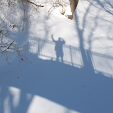 They are migratory, leaving us in the fall for warmer places. One town in Ohio, Hinkley, celebrates their return in the spring.
They are migratory, leaving us in the fall for warmer places. One town in Ohio, Hinkley, celebrates their return in the spring. I found a large group soaring over the Babcock Quarry. I wonder if there was a thermal there. Earlier in the morning I had searched south of town, trying to find them roosting. The first place I checked did not have them, so I went a bit further south and found a bunch of them warming in the morning sun.
I found a large group soaring over the Babcock Quarry. I wonder if there was a thermal there. Earlier in the morning I had searched south of town, trying to find them roosting. The first place I checked did not have them, so I went a bit further south and found a bunch of them warming in the morning sun. They sometimes spread their wings to capture more heat, and look a bit eerie when they do so. I wish I could have gotten closer or had a better camera. They are shy birds and do not care to have people close to them.
They sometimes spread their wings to capture more heat, and look a bit eerie when they do so. I wish I could have gotten closer or had a better camera. They are shy birds and do not care to have people close to them.A couple days after I took the pictures above, I found the vultures dining on fish.
 Less than a week after the water had dried up, this is what was left of the carp. I do not know how much the vultures ate and how much the insects ate (the area was crawling with maggots), but the forces of decay are pretty potent.
Less than a week after the water had dried up, this is what was left of the carp. I do not know how much the vultures ate and how much the insects ate (the area was crawling with maggots), but the forces of decay are pretty potent. (In a conversation I had during the intermission of the Children's Summer Theater play, I was told that the vultures started to spend summers here only about ten years ago. Anyone know anything about that?)
(In a conversation I had during the intermission of the Children's Summer Theater play, I was told that the vultures started to spend summers here only about ten years ago. Anyone know anything about that?)



No comments:
Post a Comment